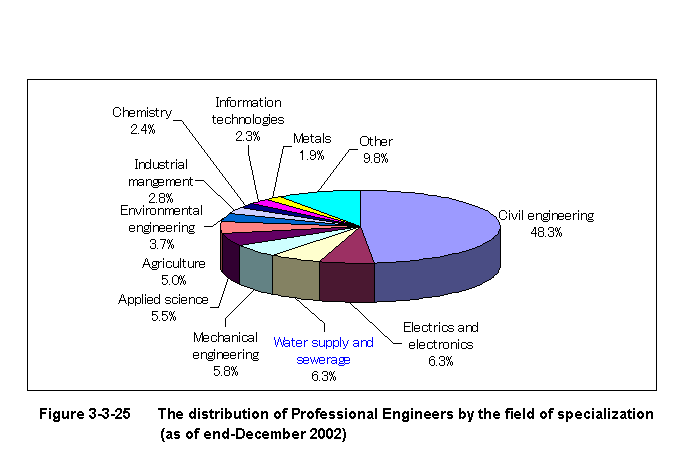| Home > Policy > White Paper, Notice, Announcement > White Paper > WHITE PAPER ON SCIENCE AND TECHNOLOGY2003 > Part3 3.3 3.3.4 3.3.4.2 | ||
To achieve the science and technology based country,it is necessary to create industrial frontiers and strengthen international competitive power through technological innovation,as well as strengthen the technological foundation.For this purpose,efforts are being made to foster sufficient leading engineers through the following policies.
| 3.3.4.2.1Professional Engineer System |
Professional Engineer System is aiming at to ensuring the appropriateness of engineering and advancing the national economy through improving science and technology,by conferring Professional Engineer on those who are engaged in engineering services with high ability.
Those who apply for Professional Engineer are required to pass the national examination which is executed in20fields of specialization and get registered as Professional Engineer.The examinations are held annually for both Professional Engineer and Associate Professional Engineer(Engineer in Training).
In FY2002,the test was done,with3,585individuals certified as Associate Professional Engineer and9,078certified as Professional Engineer.As of end-December2002,there were a total of49,390people registered as Professional Engineer and10,242registered as Associate Professional Engineer.The distribution by sector was referred to Figure3-3-25 .

In addition,Subdivision on Professional Engineer of the Council for Science and Technology is currently engaged in a review of the20engineering sections included in the test,from the viewpoints of the objectives and functions of the Professional Engineer System,development of human resources,and development of science and technology.
| 3.3.4.2.2Mutual Exemption of Engineering Qualification |
Based on the Osaka Action Agenda adopted at the APEC summit meeting of1995,work has been progressing on the"APEC Engineer Mutual Re-cognition Project"for promotion of mutual acceptance of engineer qualifications within the APEC region.Japan has actively participated in studies for this project,toward realization of mutual recognition of the Professional Engineer qualification with the corresponding qualifications overseas.
In November2000,the"APEC Engineer Manu-al"was published based on the results of studies at APEC.As of June2002,there were10participating economies in the register,including Japan.By October2002,1,676civil engineers and352structural engineers were recognized as APEC engineers.
In addition,studies are in progress on the possibility of including mutual recognition of engineer qualifications in The Agreement between the Re-public of Singapore and Japan for a New-Age Economic Partnership signed in January2002.
| 3.3.4.2.3Supporting the Continuing Professional Development |
It is indispensable that individual engineers always take in the latest outcome and expertise of the technology with Continuing Professional Development(CPD)and improve technical capability to strengthen domestic technical infrastructures,and Ministry of Education,Culture,Sports,Science,and Technology actively supports this policy.
Based on such awareness,the Japan Science and Technology Agency opened the Web Learning Plaza to the public on October1,2002.The Web Learning Plaza provides Internet-based self-study educational materials.
(address:http://WebLearning-Plaza.jst.go.jp).
| Back to Top | MEXT HOME |